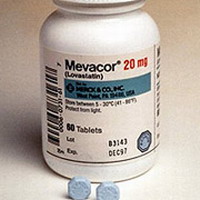Food and Drug Administration stands against sale of scholesterol-lowering Mevacor without prescription
It remains in question whether too many of the wrong people will take cholesterol-lowering Mevacor if it's sold without a prescription.

Merck wants its Mevacor, one of the famed "statin" family of drugs, to become the first U.S. nonprescription anti-cholesterol medicine. It says offering a low dose on open drugstore shelves, next to the aspirin, could provide important care to millions of deemed at moderate risk of heart disease who don't yet take cholesterol-lowering drugs.
But twice before the Food and Drug Administration has rejected what would be an unprecedented move. Unlike most over-the-counter remedies for headaches or allergies, Mevacor is meant to prevent future heart disease by treating something that causes no immediate symptoms. It takes a laboratory test to tell if cholesterol is high to begin with, and another one to tell if statins are lowering it.
Mevacor's move would require a balancing act, to make sure people who don't really need a drug to lower cholesterol aren't put at unnecessary risk of side effects - and that people with really bad health see a doctor instead of self-medicating with doses lower than many will need.
A preliminary Food and Drug Administration review released Tuesday agreed that nonprescription Mevacor would be "a reasonably safe and effective" option - if consumers used it as directed.
But when Merck tested if consumers could judge who was a proper Mevacor candidate, only 20 percent answered all the questions completely correctly, concluded FDA's lead medical reviewer. That rose to 50 percent if researchers counted people who said they'd check some things with their doctor before purchasing.
Moreover, about 30 percent of people who already were diagnosed with heart disease, diabetes or had had a stroke wanted to purchase over-the-counter Mevacor, people who need a doctor's care, the FDA documents say.
The studies "have not convinced this reviewer that there is adequate consumer comprehension of the proposed product label to ensure safe and effective use of this product," the preliminary assessment concluded.
Merck counters that most consumers - 72 percent of the almost 1,500 in the study - ultimately made the right decision on whether they were candidates for OTC Mevacor even if they answered some questions incorrectly.
On Thursday, Merck will present its case to the FDA's independent scientific advisers, and key to the debate will be how consumers assess if they're good candidates for the drug or not.
Among the criteria:
-Men must be 45 or older, and women 55 or older
-They must have so-called "bad" or LDL-type cholesterol levels between 130 and 170
-They also must have at least one other risk factor, including smoking, a low HDL or "good" cholesterol level, high blood pressure, or a relative with heart disease at a young age.
-Users must not already have heart disease, or have very high cholesterol, diabetes or be a stroke survivor.
-They must not have liver disease, be pregnant or breast-feeding, or have had muscle pain from taking any previous cholesterol medicine, all risks for side effects.
Say a 42-year-old man wanted to use Mevacor. His age should rule him out. But if the man's father died young of a heart attack and his cholesterol already is high, is it wrong to try OTC Mevacor?
"That type of person is not being treated, for the most part, in our health care system today," said Merck vice president Jerry Hansen. "We really do believe Mevacor OTC can have a major impact on public health, in helping that moderate-risk patient who should be treated."
Many doctors disagree, worrying that high-risk patients will drop their current medications for the convenience of skipping doctor visits and consequently get worse.
"This will not enhance public health and in some cases, patients currently getting full doses of more potent statins will end up on these mini doses," said Dr. Steven Nissen, a prominent cardiologist at the Cleveland Clinic. "This is not the right way to get people to lower their cholesterol."
But the cardiology community is far from unanimous. The American College of Cardiology opposes nonprescription Mevacor, while the American Heart Association is remaining neutral.
Thursday, Merck will pledge responsible marketing if Mevacor is allowed over the counter, promising to make clear that "the product is not right for everyone" and to push diet and exercise as important cholesterol reducers, too.
Subscribe to Pravda.Ru Telegram channel, Facebook, RSS!


